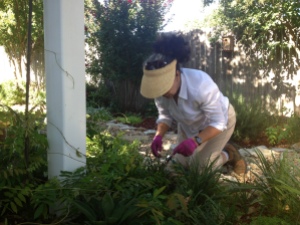Los efectos secundarios de los antidepresivos en la conducta sexual del paciente pueden convertir a una persona adulta y sexualmente activa en un individuo apático interesado sólo en abrazos y besos, pero no en el acto sexual. Esto puede llevar a serios problemas conyugales pues la persona mentalmente sana lucha por aceptar la falta de interés sexual de su pareja. Las personas afectadas por este problema usualmente buscan otro medicamento para contrarrestar los efectos de los antidepresivos. El tratamiento basado en medicamentos controla sólo los síntomas de la enfermedad, pero no guía al paciente a una recuperación exitosa.
En terapia, el paciente es capaz de explorar la razones detrás de sus temores, sensación de fatalidad, y obsesiones. Una buena terapia también orienta al paciente a reconocer sus síntomas, a tolerar los aspectos menos perturbadores de la enfermedad, y a desarrollar habilidades para vivir con esos síntomas. El paciente todavía necesita medicamentos, pero en menos cantidades y con menos efectos secundarios.
Una persona que necesita antidepresivos para controlar sus obsesiones, por ejemplo, puede comprender las razones de esas obsesiones, y usar ese conocimiento para desarrollar una destreza o una especialización en la que utilice la atención al detalle. Por ejemplo, al reorientar mis obsesiones eliminando mala hierba en mi jardín, he minimizado la necesidad de tomar altas dosis de antidepresivos. Como consecuencia, disfruto tanto de una vida sexual sana como de un jardín hermoso.
Fue sólo a través de largas horas de terapia y conversación como comprendí que mi obsesión nace de una necesidad de tener control sobre algo. Mientras gané ese conocimiento, tuve que soportar los efectos secundarios de las medicinas y lentamente construir las habilidades para vivir con mis síntomas (conducta repetitiva e impulsiva). La terapia efectiva toma tiempo y paciencia, y tanto el proveedor como el paciente deben entender que la recuperación se extiende más allá del control de síntomas y necesita más que una dosis alta de medicina.
The side effects of antidepressants on sexual behavior of the patient can turn an adult, sexually active person into an apathetic individual interested only in cuddling and kissing, but not in actual sexual intercourse. This can lead to serious conjugal problems as the mentally healthy spouse struggles to come to terms with his/her partner lack of interest in sex. People afflicted by this problem usually seek another chemical to counter act the effects of the antidepressants. Chemically based treatment controls only the symptoms of the disease, but doesn’t lead the patient to successful recovery.
In therapy, the patient is able to explore the underlying reasons for her fears, sense of doom, and obsessions. Good therapy also guides the patient to recognize her symptoms, tolerate less disruptive aspects of her disease, and develop coping skills to live with those symptoms. The patient will need medication, but in much less quantities, with much less side effects.
A person who needs antidepressants to control obsessions, may, for instance, learn to understand the underlying reason for her obsession, and use her insight to develop a craft or a trade that utilizes attention to detail. For instance, by refocusing my obsession to eliminate the weeds in my garden, I have minimized the need to take a high dose of antidepressant. As a consequence, I enjoy both a healthy sex life and a beautiful garden.
It was through long hours of therapy and conversation that I understood my obsession was born out of a need to have control over something. While I gained that insight, I put up with the side effects and slowly built the copings skills to live with the symptom (repetitive, compulsive behavior.) Effective therapy takes time and patience, and both provider and consumer should understand that recovery extends far beyond the control of symptoms and needs more than a high dose of medication.







